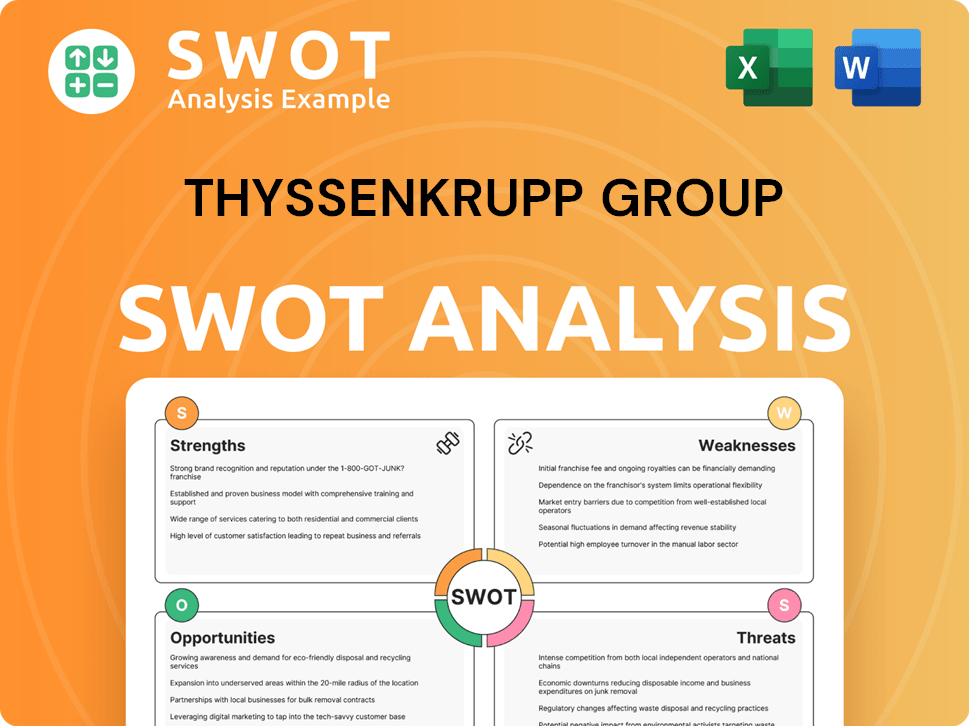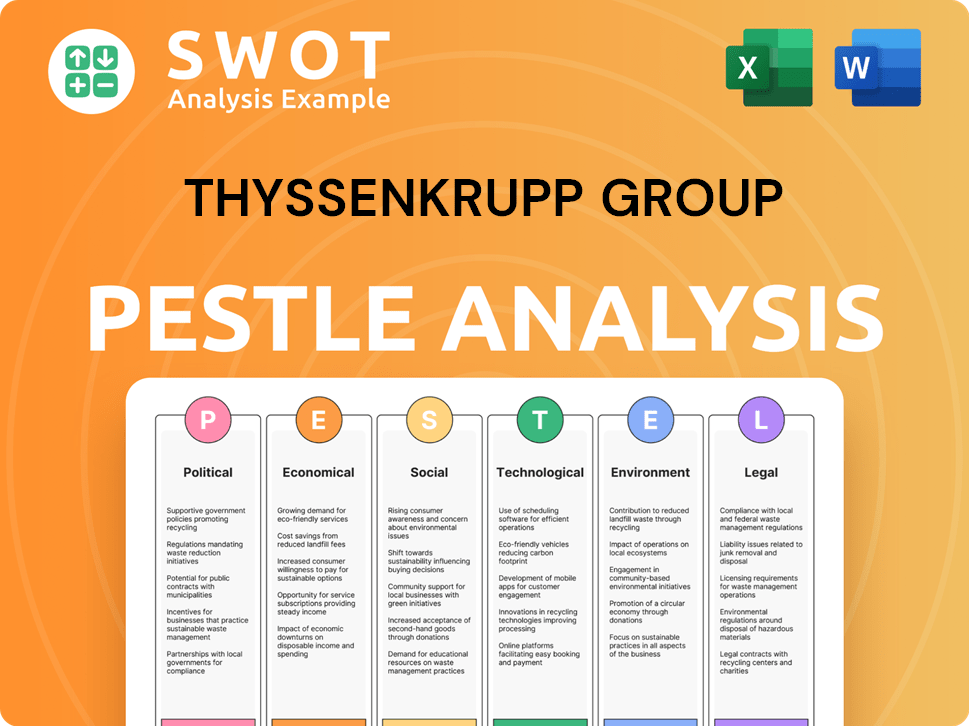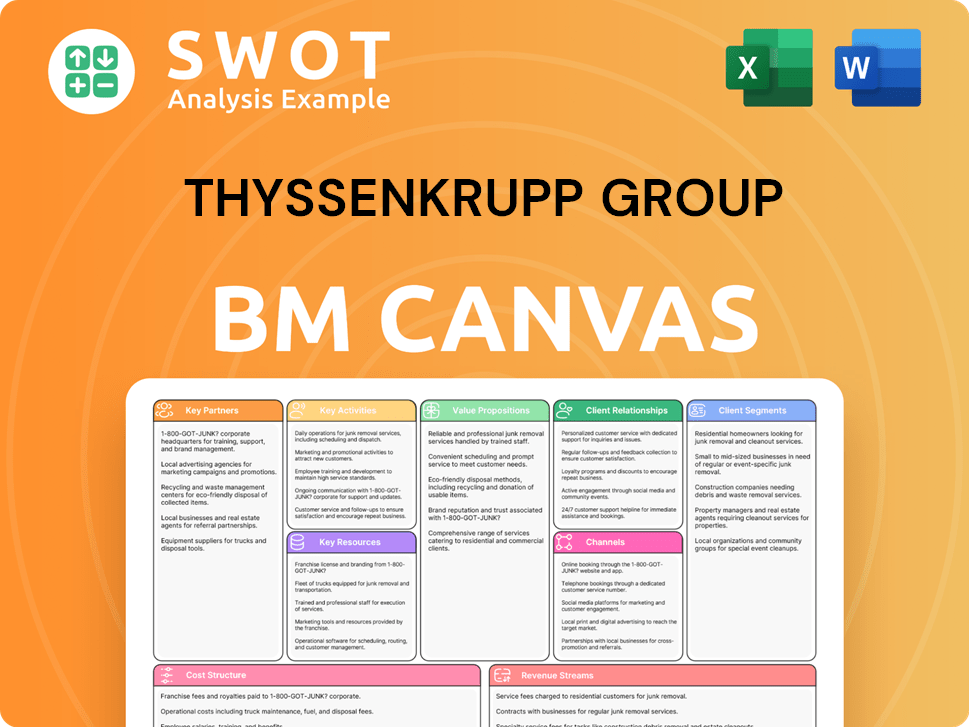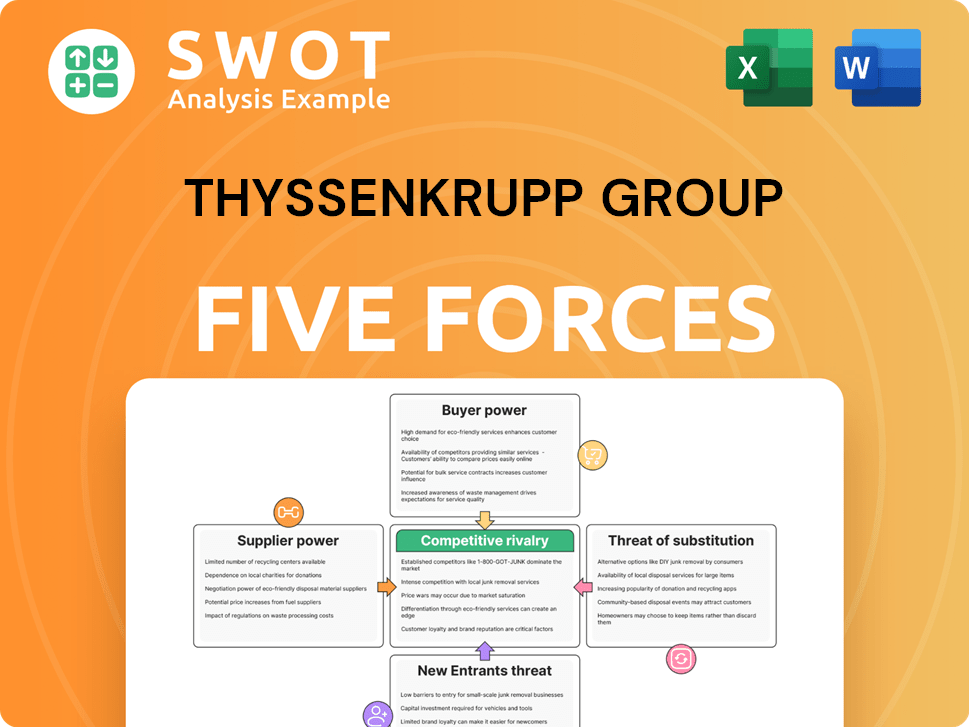ThyssenKrupp Group Bundle
How is ThyssenKrupp Reshaping its Sales and Marketing Game?
ThyssenKrupp, a global industrial powerhouse, is not just about steel anymore; it's a masterclass in adapting sales and marketing for a changing world. From its strategic pivot into the green hydrogen market, notably through ThyssenKrupp Group SWOT Analysis, to its embrace of digital channels, the company is constantly evolving. Discover how ThyssenKrupp's innovative strategies are shaping its future.

This exploration will uncover the intricacies of ThyssenKrupp's sales strategy, examining its customer-centric approach and the marketing tactics that fuel its brand. We'll analyze the company's brand positioning strategy and delve into specific marketing campaign examples, providing insights into how ThyssenKrupp navigates market challenges and leverages its competitive advantage. Furthermore, we'll investigate ThyssenKrupp's digital marketing initiatives, sales growth strategies, and the overall impact on its market share analysis.
How Does ThyssenKrupp Group Reach Its Customers?
The sales strategy of ThyssenKrupp Group is multifaceted, leveraging both traditional and modern channels. Historically, direct sales and B2B interactions were crucial, especially for complex industrial solutions. This approach remains significant, particularly in sectors like plant engineering and large-scale projects, contributing to substantial order backlogs.
The company has significantly evolved its approach with a strong emphasis on digital adoption and omnichannel integration. ThyssenKrupp also utilizes key partnerships and exclusive distribution deals to broaden its market reach. This includes strategic collaborations aimed at ensuring cost-effective and climate-friendly production, enhancing its competitive advantage.
ThyssenKrupp's sales and marketing efforts are designed to reach a diverse customer base. This combination of strategies supports its overall business model and market analysis.
Direct sales teams and traditional B2B interactions remain a crucial component, especially for complex industrial solutions. These interactions often involve telephone, fax, and on-site visits. For instance, thyssenkrupp Marine Systems secured significant orders, including an order extension for four additional submarines in December 2024.
ThyssenKrupp has significantly evolved its channels with a strong emphasis on digital adoption. ThyssenKrupp Materials Services has implemented a widespread digital transformation strategy. This includes enhancing existing e-commerce portals and driving an omnichannel approach through solutions like SAP Commerce Cloud.
Key partnerships and exclusive distribution deals also play a vital role in ThyssenKrupp's sales strategy. In April 2024, ThyssenKrupp AG agreed with EP Corporate Group (EPCG) to acquire a 20% stake in ThyssenKrupp's steel business. These collaborations contribute significantly to growth and market share.
The Digital Sales Lab (DSL) functions as ThyssenKrupp's group-wide sales excellence and digital marketing unit. It acts as a global partner for sales strategy, customer analytics, and the implementation of digital sales and marketing solutions, supporting the overall Growth Strategy of ThyssenKrupp Group.
ThyssenKrupp's sales channels are diverse, including direct sales, digital platforms, and strategic partnerships. The company focuses on both traditional B2B interactions and advanced digital solutions to meet customer needs. This approach supports its market share analysis and brand positioning strategy.
- Direct Sales Teams: Crucial for complex industrial solutions and large projects.
- Digital Platforms: E-commerce portals and omnichannel strategies, such as the SAP Commerce Cloud.
- Strategic Partnerships: Collaborations like the one with EP Corporate Group and Kongsberg Defence & Aerospace.
- Digital Sales Lab (DSL): Focuses on sales excellence and digital marketing solutions.
ThyssenKrupp Group SWOT Analysis
- Complete SWOT Breakdown
- Fully Customizable
- Editable in Excel & Word
- Professional Formatting
- Investor-Ready Format

What Marketing Tactics Does ThyssenKrupp Group Use?
The marketing tactics employed by ThyssenKrupp Group are designed to boost brand awareness, generate leads, and drive sales across its diverse industrial sectors. A customer-centric approach, supported by data-driven insights, forms the core of their strategy. This allows them to anticipate customer needs and tailor product offerings effectively.
Digital marketing is a crucial part of the company's current strategy. The Digital Sales Lab (DSL) plays an important role in developing customer analytics and digital sales and marketing solutions. This includes a focus on digital commerce solutions, such as B2B portals for ThyssenKrupp Materials Services, where they have seen notable improvements in conversion rates. The company also emphasizes content marketing, search engine optimization (SEO), and a strong online presence to support its different segments.
While specific details on paid advertising, email marketing, or influencer partnerships are not readily available, the broader digital transformation suggests a move towards these modern tactics to engage customers and boost efficiency. The digitalization efforts aim to reshape traditional business models and improve how the company presents itself to the outside world. Understanding the Competitors Landscape of ThyssenKrupp Group is crucial for refining their marketing strategies.
ThyssenKrupp focuses on digital commerce solutions, particularly B2B portals. These platforms have increased conversion rates for online stores, streamlining sales processes.
Content marketing and SEO are key strategies to enhance online visibility. These tactics support various segments of the company, driving organic traffic and engagement.
Customer segmentation is used to tailor products and services to specific customer needs. This approach was evident in the development of new elevator product lines, reflecting a customer-focused strategy.
Innovation and sustainability are core components of the marketing message. These elements help differentiate the company in the market, attracting customers and investors.
Digital transformation is a major focus, reshaping traditional business models. This shift aims to improve how the company interacts with customers and the external environment.
Data-driven insights and predictive analytics are used to understand and anticipate customer needs. This enables the company to proactively offer tailored solutions.
ThyssenKrupp's marketing strategy includes a mix of digital and traditional methods. The company emphasizes customer-centric approaches and data-driven insights to enhance its market presence and sales performance.
- Digital Marketing: Focus on B2B portals, content marketing, and SEO to improve online presence and conversion rates.
- Customer-Centric Approach: Tailoring products and services based on customer segmentation and needs.
- Innovation and Sustainability: Highlighting these aspects to differentiate the brand and attract customers.
- Data Analytics: Leveraging data to understand customer behavior and predict future needs.
- Digital Transformation: Aiming to reshape business models and enhance customer interactions.
ThyssenKrupp Group PESTLE Analysis
- Covers All 6 PESTLE Categories
- No Research Needed – Save Hours of Work
- Built by Experts, Trusted by Consultants
- Instant Download, Ready to Use
- 100% Editable, Fully Customizable

How Is ThyssenKrupp Group Positioned in the Market?
ThyssenKrupp's brand positioning centers on its engineering prowess, innovation, and commitment to sustainability. The company distinguishes itself by delivering advanced technological solutions, enhancing efficiency and quality of life. This focus is crucial for its ThyssenKrupp sales strategy and overall market presence.
The core message emphasizes driving industrial progress and leading the global market through innovation, sustainability, and customer satisfaction. This approach is vital for the ThyssenKrupp marketing strategy, targeting B2B clients across various industrial sectors. Its reputation for quality and global network supports its position as a reliable partner.
A key element of the ThyssenKrupp Group brand positioning involves offering customized engineering solutions to meet evolving client needs. For example, thyssenkrupp nucera, a segment focused on green hydrogen, highlights its technology leadership in electrolysis, aiming to accelerate the shift to sustainable energy systems. This positions the company for future growth.
ThyssenKrupp leverages its engineering expertise to provide cutting-edge solutions. This is a cornerstone of its brand identity, focusing on technological advancements and practical applications.
Sustainability is integral to the brand, with goals like climate neutrality by 2050. This commitment is crucial for attracting environmentally conscious clients and investors. This is a key element of its ThyssenKrupp sales and marketing challenges.
The company focuses on providing customized solutions to meet client needs. This approach is critical for building strong relationships and ensuring customer satisfaction. This is a key element of its ThyssenKrupp customer relationship management.
ThyssenKrupp's extensive global network supports its ability to serve clients worldwide. This broad reach enhances its market presence and ability to deliver solutions. This is a key element of its ThyssenKrupp international sales strategy.
Brand consistency is maintained across its diverse segments, with a unified commitment to technological excellence and sustainable practices. The company actively communicates its ESG information to capital markets and emphasizes its position as an attractive employer. For more insights into the ownership structure and financial aspects, consider reading about Owners & Shareholders of ThyssenKrupp Group.
ThyssenKrupp consistently highlights its technological advancements. This focus drives innovation in its products and services, maintaining a competitive edge. This is a key element of its ThyssenKrupp competitive advantage.
The company integrates sustainability into its core operations and brand messaging. This approach aligns with evolving market demands and enhances its reputation. This is a key element of its ThyssenKrupp sustainability marketing efforts.
ThyssenKrupp prioritizes customer satisfaction through tailored solutions and reliable service. This customer-centric approach helps build long-term relationships. This is a key element of its ThyssenKrupp sales growth strategies.
The company continuously invests in innovation to stay ahead of industry trends. This helps it develop new products and services that meet market demands. This is a key element of its ThyssenKrupp innovation in sales and marketing.
ThyssenKrupp actively communicates its ESG performance to stakeholders. This transparency enhances its credibility and attracts investors. This is a key element of its ThyssenKrupp brand positioning strategy.
The rebranding of thyssenkrupp Marine Systems to TKMS in June 2025, with the claim 'Your Maritime Powerhouse,' reflects a strategic shift. This move aims to establish TKMS as an independent entity with a clear focus on technological excellence in the naval industry. This is a key element of its ThyssenKrupp market share analysis.
ThyssenKrupp Group Business Model Canvas
- Complete 9-Block Business Model Canvas
- Effortlessly Communicate Your Business Strategy
- Investor-Ready BMC Format
- 100% Editable and Customizable
- Clear and Structured Layout

What Are ThyssenKrupp Group’s Most Notable Campaigns?
The focus of the company's sales and marketing efforts centers on strategic initiatives and product launches, which serve as significant 'campaigns'. These campaigns are crucial for defining the brand and driving growth, particularly within the B2B industrial sector. The company's commitment to sustainability and its ongoing 'green transformation' are key drivers, influencing product development, partnerships, and overall communication strategies.
One of the major strategic shifts involves the realignment of its portfolio, with a strong emphasis on decarbonization technologies. This is exemplified by the establishment of the Decarbon Technologies segment in October 2023. This segment bundles key businesses, positioning the company as a technology leader in the energy transition. The shift towards digital transformation, especially within Materials Services, also represents a significant marketing initiative.
These campaigns are supported by a commitment to digital transformation and strategic partnerships. These efforts aim to enhance customer experience and drive operational efficiency. The company's sales and marketing strategies are geared toward strengthening its market position and fostering sustainable growth.
The establishment of the Decarbon Technologies segment in October 2023 demonstrates a strategic focus on the energy transition. The rebranding of thyssenkrupp Uhde Chlorine Engineers to thyssenkrupp nucera in 2022 signaled a new era of hydrogen innovation. The company aimed to achieve revenues of approximately €600-700 million by 2024/2025 in its alkaline water electrolysis (AWE) business.
The implementation of enhanced e-commerce portals and an omnichannel approach has driven significant revenue growth. The use of solutions like SAP Commerce Cloud has resulted in a 20% increase in revenue from the e-commerce portal. The Digital Sales Lab (DSL) plays a crucial role in implementing digital sales and marketing solutions.
The strategic partnership with EP Corporate Group (EPCG), which saw EPCG acquire a 20% stake in April 2024, aims to ensure resilient, cost-efficient, and climate-friendly steel production. This move is a major step toward a planned 50:50 joint venture. This collaboration is a key element of the company's broader strategy.
The strengthened strategic naval partnership with Kongsberg Defence & Aerospace, solidified in June 2025, supports defense requirements and drives industrial growth. The rebranding of thyssenkrupp Marine Systems to TKMS in June 2025, with the claim 'Your Maritime Powerhouse,' aims to establish a strong identity. TKMS has a record order backlog of approximately €18 billion.
These key campaigns, from decarbonization to digital transformation and strategic partnerships, are integral to the company's sales and marketing strategy. They reflect a commitment to innovation, sustainability, and customer-centric approaches. For more details on the company's business model, see Revenue Streams & Business Model of ThyssenKrupp Group.
ThyssenKrupp Group Porter's Five Forces Analysis
- Covers All 5 Competitive Forces in Detail
- Structured for Consultants, Students, and Founders
- 100% Editable in Microsoft Word & Excel
- Instant Digital Download – Use Immediately
- Compatible with Mac & PC – Fully Unlocked

Related Blogs
- What are Mission Vision & Core Values of ThyssenKrupp Group Company?
- What is Competitive Landscape of ThyssenKrupp Group Company?
- What is Growth Strategy and Future Prospects of ThyssenKrupp Group Company?
- How Does ThyssenKrupp Group Company Work?
- What is Brief History of ThyssenKrupp Group Company?
- Who Owns ThyssenKrupp Group Company?
- What is Customer Demographics and Target Market of ThyssenKrupp Group Company?
Disclaimer
All information, articles, and product details provided on this website are for general informational and educational purposes only. We do not claim any ownership over, nor do we intend to infringe upon, any trademarks, copyrights, logos, brand names, or other intellectual property mentioned or depicted on this site. Such intellectual property remains the property of its respective owners, and any references here are made solely for identification or informational purposes, without implying any affiliation, endorsement, or partnership.
We make no representations or warranties, express or implied, regarding the accuracy, completeness, or suitability of any content or products presented. Nothing on this website should be construed as legal, tax, investment, financial, medical, or other professional advice. In addition, no part of this site—including articles or product references—constitutes a solicitation, recommendation, endorsement, advertisement, or offer to buy or sell any securities, franchises, or other financial instruments, particularly in jurisdictions where such activity would be unlawful.
All content is of a general nature and may not address the specific circumstances of any individual or entity. It is not a substitute for professional advice or services. Any actions you take based on the information provided here are strictly at your own risk. You accept full responsibility for any decisions or outcomes arising from your use of this website and agree to release us from any liability in connection with your use of, or reliance upon, the content or products found herein.